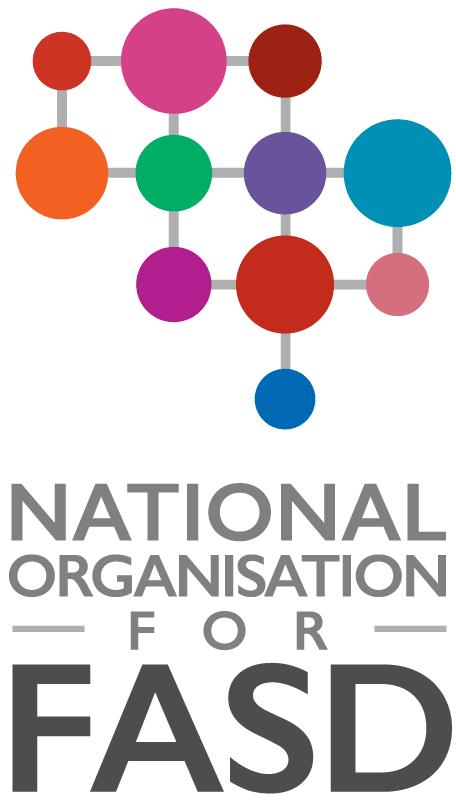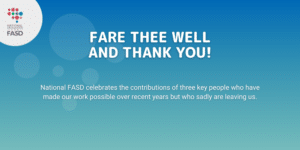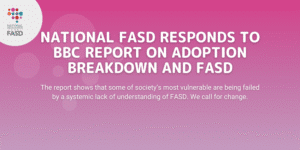This is excerpted from FASD: Learning with Hope. It was written by Sandra Butcher, a year before she joined National FASD as chief executive. Though it focuses on children, the same applies for adults who might have been exposed to alcohol in pregnancy. They also deserve the dignity of a diagnosis and the support and understanding it entitles them to receive.
I want to reach out for the sake of some beautiful child who is out there somewhere in this world – maybe it’s a child you know, maybe it’s your kid – a child who is shining brightly but who too often goes through his or her day misunderstood, confused, frustrated, ‘in trouble,’ angry or overstimulated.
Ideally, I would want to be holding his parents’ hands and looking into their eyes so they can see my empathy (without accusation) while I ask them to think of things no parent should ever have to think about. I want to reassure them that if in fact what I am asking them to think about is true, the sun will keep sparkling in their child’s eyes, her laughter will still be the best sound they can ever hear, his sweet kiss will always bring them a feeling of tomorrows and futures and hope. Nothing we might talk about will change that.
I want to ask a question that can perhaps open doors for their child’s future that might otherwise be closed, a question whose answer can perhaps provide that missing link that people have been searching for when trying to better understand this beautiful being and her shifting, sometimes stormy moods. I want to ask a question that I know may put someone on the defensive, when what I most want to do is reach past those defenses and lend a helping and reassuring hand.
I want to ask carefully, quietly, respectfully the one question that could unlock the brighter tomorrows we all want for this wonderful child:
“Did mum drink during pregnancy, maybe even before she knew she was pregnant?”
This is not a judgmental question. I am asking everyone to set aside whatever stigmas might hold back this conversation. If the answer is 100% “no,” then I am glad it is possible to move on to other options for what might be causing their child some difficulties.
If their answer is in their heart of hearts, “yes, mum did drink during pregnancy” (maybe a little, maybe a lot) or if the answer is “Our child is adopted/in care and we simply don’t know,” then it’s time to explore further questions.
Please hear me, I am not judging. This is not about blaming anyone for anything. It’s about helping this wonderful soul. It’s a conversation I wish someone had with us several years ago.
I’m no expert. But if I were sitting there with these parent(s) or caregivers, these are the questions that I would ask, to open up the discussion.
- Does your child get overstimulated easily? When you are out in the grocery store, when there’s loud noise, or something doesn’t go the way he expected, does he ‘flip out’ or have extreme tantrums you don’t know what to do with? I mean extreme – do these moments seem wilder and longer than you might expect? Do you feel bewildered, unable to ‘control’ the outbursts, does it seem like everything you do doesn’t help? Does he sometimes kick and bite and shriek? Does he strike out sometimes like a cornered cat?
- Or does she switch off sometimes, get a ‘blank look’? Does she retreat, maybe into small spaces, under blankets, pull clothes up over her head?
- Does she get stuck on one thing over and over and over again? Does she sometimes repeat sounds, is she ‘fixated’ on certain videos or songs? Does she have unusual things that she likes, things that she comes back to again and again?
- Are there toileting problems? Does he bang his head? Rock to calm down? Does he pick at, poke, or bite himself, sometimes until he bleeds?
- Does she seem unable to link cause and effect? Are time outs hopeless, drawn out, and unproductive for your child? Does she have trouble remembering why she is ‘in trouble’?
- Does he have royal meltdowns coming and going from different places? Is it sometimes impossible to get him to put on his coat or his shoes when it’s time to go? Is it absolute ‘chaos’ trying to get out the door for school or nursery?
- Does he just not ‘get’ time – does he seem not to understand the difference between five minutes and 30 minutes and next week and next year?
- Does she have a strong reaction to whether it is light and dark, or too smelly or too scratchy? Does she hate wearing socks that are too tight, tags on clothes, or do you have battles because some clothes feel funny?
- Does he have trouble ‘relaxing’ or just sitting still? Is it hard for him to focus for long stories? Does he lose track of the story, does he ‘miss the point’? Does he take things very literally, get confused if you make an analogy?
- Does he have great trouble falling asleep? Are nap times and bedtimes battles? Does he ‘rev up’ when other kids would wind down?
- Does she get easily side-tracked if you tell her to go into the other room to get something? Do you find her later wandering around or doing something else, having completely forgotten what you asked her to do?
- Is he hard to console? Does he get ‘hysterical’ at times when you don’t really understand why?
- Does she have other physical conditions, like trouble with the spine, hips, legs, trouble with motor skills? Does it seem like she needs to jump around a lot? Does she need to feel a lot of pressure to comfort her?
I am talking about extremes. Is your kid always ‘the handful’ – the one that people shake their heads about, the one who you can’t quite get to do what you want her to do? Are you at wit’s end trying to figure out what’s going on?
I am speaking directly to your heart: if you answered ‘yes,’ mum did drink alcohol (any amount) while pregnant (maybe even before she knew she was pregnant) or your child is adopted/in care and you just don’t know, and if when your read some of those points above some of those hit home (it doesn’t have to be all of them, or even most of them) – not as in a ‘yeah there was that one time when’ kind of way but in an ‘Oh my, yes, that happens all the time’ kind of way, then maybe you might need to consider that there might be more to these difficulties in self-regulating than the way you parent or whether he has had too much sugar in a day.
There may be something deeper, something structural, something that is just a little too much for your parenting skills to handle alone without further information, further medical help.
I want to say to those loving parents/carers/guardians/family/friends, I am sorry to bring these thoughts into what should be your child’s sweetest days. I am sorry to add worry when I know you already are worried. I am sorry that our society does not make it easier to talk about these things.
I want to hold those hands and look into their eyes and say, “You are not alone.”
Do not let a doctor turn you away just because your child might not have ‘the look’ – very few kids on the spectrum have those facial features which as it turns out relate to specific damage done during only a very few days in early pregnancy (and even those kids who have ‘the look’ outgrow it). Despite what some doctors may tell you, facial features are not the only indication of alcohol related neurological deficits. Ask for an FASD evaluation by qualified experts – too many kids are misdiagnosed. Even our son, who did in fact ultimately measure for 100% of the facial features, went undiagnosed for 10 years.
If the experts think this is worth further exploring, go into high gear.
Educate yourself, instantly start reading about and implementing FASD parenting strategies. We wasted a valuable year and a half from when this was first raised as a possibility and when we finally got the diagnosis. The fact is, the brain structure of kids with FASDs is different. The typical neural pathways have been damaged. As a result, traditional parenting strategies do not work. You will need to readjust things in order to create an environment that will be more manageable for your child. You will need to get the schools to think about strategies for both primary and secondary schools.
The world opens up again for those with FASD once people around them – at home, in schools, in families – understand they are seeing the world through a different lens. The damage, I am so sorry to say, is irreversible, but there are tools to help your child cope better as they grow. I firmly believe the new technologies in our world will immensely help the generation of kids being diagnosed today, so their futures can be even brighter.
There are way too many adults walking through this world who have undiagnosed FASD. Truth is, we don’t really know which of our friends, colleagues, family members are affected – those who have always struggled, maybe got into trouble, those people who can’t seem to get themselves settled without a great deal of help, they may be walking around with an undiagnosed FASD.
There are amazing adults and young adults with FASD, some of whom received diagnoses as adults, who provide great hope. And they are the first to say how much different their lives would have been if they were properly diagnosed, if they could have avoided spending some of the hardest years of their lives never really understanding why things were so hard for them day after day after day.
You would not hesitate to take your kid to get tests if you feared a concussion. Go find the answers. If there is a chance your child has this hidden medical disability, facing this now could make a profound difference in his or her life.
Do not fear a diagnosis, fear the alternative. Fear a lifetime for your child of confusion, frustration, self-doubt, depression, maybe other problems with a system that doesn’t understand his or her needs. Don’t fear knowing, fear not knowing.
I want to whisper to that sweet child, “You will be okay. You have done nothing wrong. Your parents will get you the help and support that you need. As you grow older you will better understand all of this. You may be different and you may have to try harder than most other kids. But you are beautiful. You are loved. You are special. People will help you. Just keep shining. Keep on shining beautiful you.”



